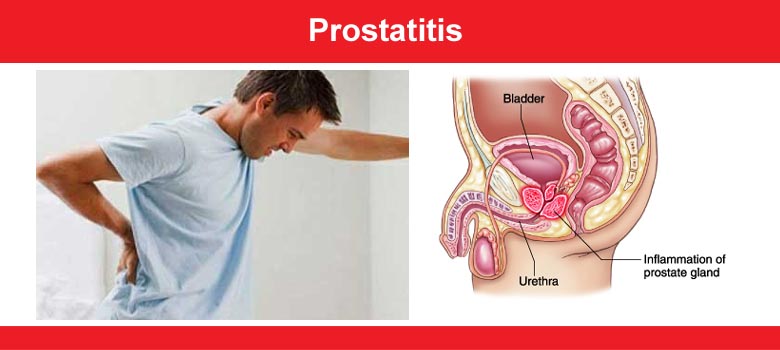
Prostate is a walnut size gland weighing about 15 to 25 grams, in males. Prostatitis is swelling and irritation of the prostate gland. The condition is called bacterial prostatitis when it is caused by an infection with bacteria.
Prostatitis Types
Acute Bacterial Prostatitis (ABP)
It is inflammation of the prostate gland caused by bacteria such as Escherichia coli and Klebsiella. Severe complications may develop if not promptly treated. ABP can be fatal if the bacterial infection is untreated and travels to the bloodstream.
Chronic Bacterial Prostatitis (CBP)
It is a recurrent infection and inflammation of the prostate and urinary tract. Symptoms are less severe than those associated with acute bacterial prostatitis.
Nonbacterial Prostatitis
It is an inflamed prostate without bacterial infection.
Prostatodynia
It is sometimes called chronic pelvic pain syndrome (CPPS), is the occurrence of prostatitis symptoms, without inflammation or bacterial infection.
Causes
Risk factors include bladder outlet obstruction (e.g., stone, tumor, BPH), diabetes mellitus, a suppressed immune system, and urethral catheterization, Some sexually transmitted diseases (STDs; e.g., non-gonnococcal urethritis, gonorrhea) increase the risk for developing bacterial prostatitis. Unprotected anal and vaginal intercourse can allow bacteria to enter the urethra and travel to the prostate.
Acute Bacterial Prostatitis
Bacterial prostatitis is caused by the growth of bacteria that are normally found in prostatic fluid, such as Escherichia coli and Klebsiella.
Chronic Bacterial Prostatitis
Sometimes bacteria remain in the prostate following acute prostatitis. Catheter tubes used to drain the urinary bladder, trauma to the urinary system or infections in other parts of the body can sometimes be the source of the bacteria.
Chronic Non-Bacterial Prostatitis
- Heavy lifting: Lifting heavy objects when the bladder is full may cause urine to back up into the prostate.
- Certain occupations: Occupations that subject the prostate to strong vibrations, such as driving a truck or operating heavy machinery, may play a role. Though biking is a good exercise for the rest of the body, it may irritate the prostate gland.
- Structural abnormalities of the urinary tract: Narrowing (stricture) of the urethra may elevate pressure during urination and cause symptoms. Sometimes prostatitis is caused by a sexually transmitted organism, such as Chlamydia. However, most cases are caused by infections that are not sexually ransmitted. These infections can't be passed on to sexual partners.
Prostatitis Symptoms
The acute form of prostatitis is the least common, but is also the most severe. Symptoms are often sudden, and the condition may require hospitalization. Symptoms of chronic prostatitis tend to develop more slowly and aren't as severe as those of acute prostatitis.
Symptoms of Acute Bacterial Prostatitis (ABP)
- Chills
- Frequent urination
- Painful urination (dysuria)
- Incomplete emptying of bladder
- Sensation of having to urinate immediately, often accompanied by bladder pain or spasm (urgency)
- Pain in penis, testicles, and area between the scrotum and the rectum (perineum)
- Painful ejaculation
- Lower back pain
- Joint pain (arthralgia)
- Muscle pain (myalgia)
- Tender, swollen prostate
Symptoms of Chronic Bacterial Prostatitis (CBP)
Symptoms of chronic bacterial prostatitis (CBP) and nonbacterial prostatitis are generally less severe than those of ABP and include the following:
- Blood in semen (hematospermia)
- Discomfort in genital area and perineum
- Dysuria: Pain or a burning sensation when urinating
- Fever
- Lower back pain
- Pain in lower abdomen
- Painful ejaculation
- Recurring urinary tract infection (UTI)
- A frequent and urgent need to urinate
- Pain in the prostate
- Excessive urination during the night (nocturia)
Symptoms of Chronic Nonbacterial Prostatitis
Chronic nonbacterial prostatitis is the most common form, yet it's also the least well understood. Researchers aren't even sure of the cause.
In general, the signs and symptoms of nonbacterial prostatitis are similar to those of chronic bacterial prostatitis, although fever is generally absent. The major difference, however, is that tests won't detect any bacteria in the urine or in fluid from the prostate gland. But there may be white blood cells in the urine and semen.
Patients with prostatodynia have symptoms of prostatitis but there is no evidence of infection or inflammation.
Treatment for Prostatitis
Dr Rajrsh Khandelwal has been working on various chronic diseases including Chronic Prostatitis and Benign prostatic hyperplasia (BPH) since 1998.
The individualized treatment is based on the study of patients prostatitis or BPH, infection, extent, cause, genetic pattern, emotional sphere, hormonal imbalance, and other factors which lead and maintain the disease.
Duration of treatment
The total length of treatment for Chronic Prostatitis and BPH depends on the following factors:
- Duration of disease
- Underlying infection, its extent and drug (antibiotics) dependency or drug-resistance
- Extent of enlargement
- Exigent of symptoms (pain, frequency, retention, residual urine, prostate weight and size)
- Associated diseases like diabetes, blood pressure, etc.
- Age of the patient
- Most patients of Chronic or recurring Prostatitis show significant results in about four months. If it is very chronic, the treatment may be longer. Cases of BPH may show improvement in symptoms and size in about six months. However, the BPH cases may need treatment for a long period.
Complications
- Collection of pus (abscess formation)
- Acute retention of the urine
- Chronic bacterial prostatitis
- Spread of the infection to the bloodstream (sepsis)
- Fertility may sometimes be affected because prostatitis influences the development of the semen and ejaculation.
Care at home
- Urinate often and completely.
- Take warm baths to relieve pain.
- Take stool softeners to make bowel movements more comfortable.
- Avoid substances that irritate your bladder, such as alcohol, caffeinated foods and drinks, citrus juices, and hot or spicy foods.
- Drink more fluid to urinate often and help flush bacteria out of your bladder.

